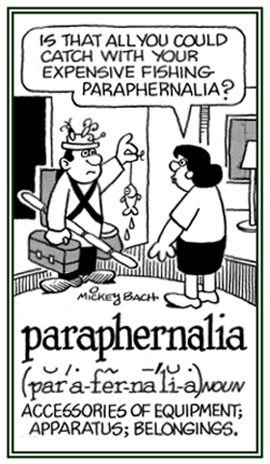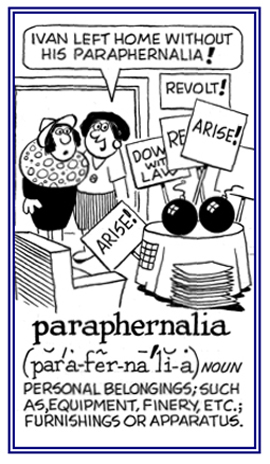para-, par-
(Greek: by the side of, beside, past, beyond; contrary, wrong, irregular, abnormal)
paranoid schizophrenia
A form of schizophrenia characterized by a persistent preoccupation with illogical, absurd, and changeable delusions; usually, of a persecutory, grandiose, or jealous nature, accompanied by related hallucinations.
The symptoms include extreme anxiety, exaggerated suspiciousness, aggressiveness, anger, argumentativeness, and hostility, which may lead to violence.
paranoid state
A transitory abnormal mental condition characterized by illogical thought processes and generalized suspicion and distrust, with a tendency toward persecutory ideas or delusions.
paranomia
Mental disorder characterized by the incorrect naming of objects or the inability to name them.
paranormal (adjective), more paranormal, most paranormal
1. Characteristic of something that is apparently, or seems to be, outside the usual sensory channels: There are some people who believe Gertrude had paranormal powers and that she could determine whether a person was telling the truth or was trying to deceive others.
2. Descriptive of anything that can't be explained, or understood, in terms of ordinary scientific knowledge: The paranormal rainfall is far greater now than it has been in the past and no one seems to know why it has increased to such a significant degree.
2. Descriptive of anything that can't be explained, or understood, in terms of ordinary scientific knowledge: The paranormal rainfall is far greater now than it has been in the past and no one seems to know why it has increased to such a significant degree.
That which is beyond the range of typical experiences or scientific explanations: There are paranormalities that involve various phenomena; such as, telepathy or a medium's supernatural powers.
paranormally (adverb), more paranormally, most paranormally
Characteristic of claimed occurrences of events or perceptions for which there are no scientific explanations: Some paranormally amazing claims involve psychokinesis (moving objects using only mental or psychic powers), extrasensory perception, or other purportedly supernatural phenomena.
paranosic
An advantage that one receives as a result of illness; applies to primary gain such as freedom from work.
paranosis
paranymph
paraph
1. A flourish made after a signature.
2. A special flourish at the end of a signature, originally as a precaution against forgery.
3. Etymology: from Middle French paraffe (French paraphe); originally, meaning "paragraph", from Middle Latin paraphus, contraction of paragraphus.


2. A special flourish at the end of a signature, originally as a precaution against forgery.
3. Etymology: from Middle French paraffe (French paraphe); originally, meaning "paragraph", from Middle Latin paraphus, contraction of paragraphus.


paraphasia
1. A form of aphasia in which a person has lost the ability to speak correctly, by substituting one word for another, and jumbling words and sentences in an unintelligible way.
2. A speech disorder of neurological origin in which the speaker's words are jumbled unintelligibly.
2. A speech disorder of neurological origin in which the speaker's words are jumbled unintelligibly.
Personal items or sets of equipment, belongings, or property which are used for particular functions: Circuses have special paraphernalia for their performances; including, ropes, horses, cages for the animals, special clothes, etc..

© ALL rights are reserved.

© ALL rights are reserved.
Go to this Word A Day Revisited Index


Go to this Word A Day Revisited Index
so you can see more of Mickey Bach's cartoons.
paraphia
A moderate fear, especially one which a person can control with reasoning: Mrs. Fisk was lucky that she only had a paraphobia instead of an extreme one, and after thinking about her problem and using logical deduction she overcame her difficulty with the dog barking next door!
paraphonia
1. Any disorder of the voice, especially a change in its tone.
2. Alteration of the voice for physiological or pathological reasons.
2. Alteration of the voice for physiological or pathological reasons.


